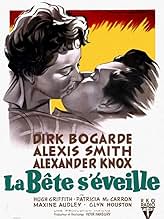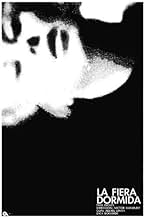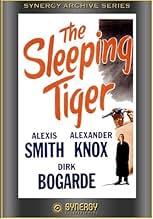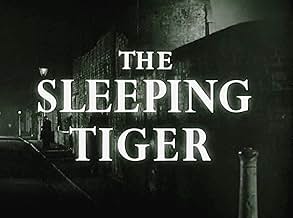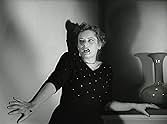VALUTAZIONE IMDb
6,5/10
1384
LA TUA VALUTAZIONE
Dopo che un detenuto irrompe nella casa di uno psicoterapeuta, accetta la riabilitazione piuttosto che l'arresto, ma la moglie del terapeuta si infatua di lui.Dopo che un detenuto irrompe nella casa di uno psicoterapeuta, accetta la riabilitazione piuttosto che l'arresto, ma la moglie del terapeuta si infatua di lui.Dopo che un detenuto irrompe nella casa di uno psicoterapeuta, accetta la riabilitazione piuttosto che l'arresto, ma la moglie del terapeuta si infatua di lui.
- Regia
- Sceneggiatura
- Star
- Premi
- 1 candidatura in totale
Jimmy Charters
- Jazz Club Patron
- (non citato nei titoli originali)
Martin Lyder
- Jazz Club Patron
- (non citato nei titoli originali)
John Lynn
- Jazz Club Patron
- (non citato nei titoli originali)
Ross Parker
- Barman
- (non citato nei titoli originali)
Jim Tyson
- Jazz Club Patron
- (non citato nei titoli originali)
Harry Van Engel
- Spectator at crash
- (non citato nei titoli originali)
Recensioni in evidenza
A more apt title would have been The Sleeping Tigress, for it's Alexis Smith's performance that holds this movie together and lends it erotic friction. Despite her old-money looks and regal carriage, Smith numbered among the many talents which Hollywood mis- and under- used. She claimed attention in two late-forties Bogart vehicles, Conflict (where she was good) and The Two Mrs. Carrolls (in which she was even better, and held her own against Barbara Stanwyck). But most of her movie career consisted of mediocre roles the ones the star actresses turned down or had to refuse owing to other commitments. (It wasn't until Stephen Sondheim's Follies on Broadway in the 70s that her own star shone).
In this film from Joseph Losey's English exile following the Hollywood witch hunt, she plays the bored wife of psychotherapist Alexander Knox (and with him pottering around the house, who wouldn't be bored?). Bleeding-heart Knox takes a troubled young man with a prison record (Dirk Bogarde) under his roof in hopes of performing a therapeutic Pygmalion job on him. At first Smith acts snooty, then grows intrigued, and finally throws herself at Bogarde with pent-up abandon.
Comes the crunch as Knox, in a three-minute Freudian breakthrough reminiscent of Lee J. Cobb's instant rehabilitation of William Holden in The Dark Past, turns the lying, thieving, abusive Bogarde into a contrite milquetoast. When Bogarde then bids her farewell, Smith careens into dementia every bit as swiftly as Bogarde was healed and feigns an assault in hopes that Knox will defend her `honor' with that gun every therapist keeps in his desk drawer....
It's a lame story that might have been more convincing in an American context; the London setting and British conventions (in particular Knox's) stifle it. Bogarde started out playing this sort of charming wrong'un but isn't especially memorable here (except for his towering pompadour that must have been borrowed from Mario Lanza). But Smith's feral feline makes The Sleeping Tiger worth the ticket price.
In this film from Joseph Losey's English exile following the Hollywood witch hunt, she plays the bored wife of psychotherapist Alexander Knox (and with him pottering around the house, who wouldn't be bored?). Bleeding-heart Knox takes a troubled young man with a prison record (Dirk Bogarde) under his roof in hopes of performing a therapeutic Pygmalion job on him. At first Smith acts snooty, then grows intrigued, and finally throws herself at Bogarde with pent-up abandon.
Comes the crunch as Knox, in a three-minute Freudian breakthrough reminiscent of Lee J. Cobb's instant rehabilitation of William Holden in The Dark Past, turns the lying, thieving, abusive Bogarde into a contrite milquetoast. When Bogarde then bids her farewell, Smith careens into dementia every bit as swiftly as Bogarde was healed and feigns an assault in hopes that Knox will defend her `honor' with that gun every therapist keeps in his desk drawer....
It's a lame story that might have been more convincing in an American context; the London setting and British conventions (in particular Knox's) stifle it. Bogarde started out playing this sort of charming wrong'un but isn't especially memorable here (except for his towering pompadour that must have been borrowed from Mario Lanza). But Smith's feral feline makes The Sleeping Tiger worth the ticket price.
At the time ,like so many others such as Dalton Trumbo,Joseph Losey used to work under pseudos because of his commie friends.
"The sleeping tiger" predates permanent features in the director's work:
-the intruder ,be it a servant "(eponymous movie) ,a licentious gypsy ("the gypsy and the gentleman" ),some kind of doppelganger ("Monsieur Klein" ,perhaps his masterpiece), a mysterious girl ("secret ceremony"),who makes the place his very own ,physically ("The servant" ) or mentally ('Monsieur Klein" ).Dirk Bogarde is fascinating in his part of a young offender :his acting is so subtle we do not know when the movie ends whether he is a victim or a perverse person,probably both.
-the depiction of the decay of a milieu the intruder will destroy : the old aristocracy in "the gypsy and the gentleman" ,the bourgeoisie in "the servant" the world of the war profiteers in " Monsieur Klein" . When Alexis Smith tells her husband's guinea pig that she got a raw deal too when she was a child but she made her way of life just the same ,the guy knows better :"because you think you are happy now?"
A shrink wants to study a case of delinquency and wakens the sleeping tiger...which is perhaps not the one you are thinking of.
Superlative performances by the three leads.
"The sleeping tiger" predates permanent features in the director's work:
-the intruder ,be it a servant "(eponymous movie) ,a licentious gypsy ("the gypsy and the gentleman" ),some kind of doppelganger ("Monsieur Klein" ,perhaps his masterpiece), a mysterious girl ("secret ceremony"),who makes the place his very own ,physically ("The servant" ) or mentally ('Monsieur Klein" ).Dirk Bogarde is fascinating in his part of a young offender :his acting is so subtle we do not know when the movie ends whether he is a victim or a perverse person,probably both.
-the depiction of the decay of a milieu the intruder will destroy : the old aristocracy in "the gypsy and the gentleman" ,the bourgeoisie in "the servant" the world of the war profiteers in " Monsieur Klein" . When Alexis Smith tells her husband's guinea pig that she got a raw deal too when she was a child but she made her way of life just the same ,the guy knows better :"because you think you are happy now?"
A shrink wants to study a case of delinquency and wakens the sleeping tiger...which is perhaps not the one you are thinking of.
Superlative performances by the three leads.
Even his staunchest devotees would have to acknowledge that the films of Joseph Losey are notoriously uneven. This one is of interest to Losey completists as it marks his first film in England although sadly, for reasons which have been well documented, both he and adaptors Foreman and Buchman were 'fronted' in the credits.
Losey has done his very best with the melodramatic material at his disposal and has given the film an edginess unusual for the time. There is a palpable sexual tension(surprisingly enough) between the psychotherapist's wife of Alexis Smith and the case for treatment of Dirk Bogarde. It must be said that Bogarde was never really convincing as a heart-throb and here relishes the chance to be menacing. Alexis Smith, cast for the American market, has an extremely challenging role which obliges her to run the gamut and being a thorough professional she surmounts whatever the script throws at her. Her character, like the film itself, goes off the rails at the end but I'm sure that Esso Oil was grateful for the free advertising. Mention must be made of Alexander Knox who navigates the psychobabble and delivers his customarily solid performance.
Whether Losey had a choice of composer for this is debatable but unlike most of his films in which the music is extremely irritating, Malcolm Arnold's powerful score here is spot on and aids the film immeasurably whilst Harry Waxman is a good choice as cinematographer, having previously shot 'Brighton Rock'.
This opus might not have represented the most auspicious start to the Losey/Bogarde collaboration but they could only get better and with the notable exception of 'Modesty Blaise', they most certainly did.
Losey has done his very best with the melodramatic material at his disposal and has given the film an edginess unusual for the time. There is a palpable sexual tension(surprisingly enough) between the psychotherapist's wife of Alexis Smith and the case for treatment of Dirk Bogarde. It must be said that Bogarde was never really convincing as a heart-throb and here relishes the chance to be menacing. Alexis Smith, cast for the American market, has an extremely challenging role which obliges her to run the gamut and being a thorough professional she surmounts whatever the script throws at her. Her character, like the film itself, goes off the rails at the end but I'm sure that Esso Oil was grateful for the free advertising. Mention must be made of Alexander Knox who navigates the psychobabble and delivers his customarily solid performance.
Whether Losey had a choice of composer for this is debatable but unlike most of his films in which the music is extremely irritating, Malcolm Arnold's powerful score here is spot on and aids the film immeasurably whilst Harry Waxman is a good choice as cinematographer, having previously shot 'Brighton Rock'.
This opus might not have represented the most auspicious start to the Losey/Bogarde collaboration but they could only get better and with the notable exception of 'Modesty Blaise', they most certainly did.
Joseph Losey, working under a pseudonym after his blacklisting, didn't want to make this overbaked British melodrama. And who can blame him, given the heavy-breathing histrionics of the screenplay, a ridiculous concoction about a psychiatrist and his sexually frustrated wife harboring a hoodlum. The plot turns are unconvincing, the music hilariously overblown, and Alexander Knox, as the shrink, terminally uninteresting.
What makes this mess watchable is its game imitation of American noir tropes (dark alleys, femmes fatales, car chases), and some good very early rock-and-roll/jazz in the pub sequences. Also, the film can be viewed as a warmup for the later Losey-Bogarde collaborations, which explored similar themes (guilt, moral ambiguity, the nature of evil) much more expertly.
What makes this mess watchable is its game imitation of American noir tropes (dark alleys, femmes fatales, car chases), and some good very early rock-and-roll/jazz in the pub sequences. Also, the film can be viewed as a warmup for the later Losey-Bogarde collaborations, which explored similar themes (guilt, moral ambiguity, the nature of evil) much more expertly.
The Sleeping Tiger is directed by Joseph Losey (using the alias Victor Hanbury) and adapted to screenplay by Derek Frye from the novel written by Maurice Moiseiwitswch. It stars Dirk Bogarde, Alexis Smith, Alexander Knox, Patricia McCarron, Maxine Audley and Hugh Griffith. Music is by Malcolm Arnold and cinematography by Harry Waxman.
When criminal Frank Clemmons (Bogarde) fails in his attempt to mug psychiatrist Dr. Clive Esmond (Knox), he is surprised to be invited to stay at the good doctor's house instead of going to prison. The doctor's motives are simple, he believes he can reform Frank whilst studying him at close quarters. Frank is only too happy to accept the offer, even more so when a relationship begins to form with Dr. Esmond's wife, Glenda (Smith). However, as passions stir and the tiger awakens, it's unlikely to end happily...
Blacklisted in Hollywood, Joseph Losey would find a home in the UK and produce some superb movies. The Sleeping Tiger has thematic links to two other great Losey movies, The Prowler (1951) and The Servant (1963), a sort of meat in the sandwich if you will. Dripping with psychologically redemptive sweat and pulsing with sexual frustrations, it's a film very much concerned with tightening the spring until it eventually explodes. And when it does it's well worth the wait, for there is no pandering to happy days endings, this has a kicker of a twist and it beats a black heart.
In the interim some patience is required as the key relationships at the centre of the plotting are steadily drawn, with Losey and Frye tantalising us with shards of character interest at regular intervals. Frank drifting on and off the rails livens proceedings, with the good doctor Esmond's loyalty putting some surprising spice in the story, while Frank's courting of Glenda (horse rides together, taking her dancing at a seedy jazz/blues club) and bullying of the maid, Sally (McCarron), keep us fascinated as to where this will end up.
Visually it's firmly in noir territory, more so in the first and last thirds, where Waxman (Brighton Rock) ensures shadows reflect the tonal shifts of plotting and the character's mental health. Arnold's (Academy Award Winner for The Bridge on the River Kwai) score is heavily jazz and blues influenced, mixing sorrowful beats with up-tempo thrums. Cast are excellent. Bogarde and Losey would compliment each other greatly and this is a good indicator of what would come during their five collaborations. Knox (Chase A Crooked Shadow) is wonderfully assured, while Smith (The Two Mrs. Carrolls) owns the movie with some deft changing of character gears.
The plot's a bit out there man, and Losey's slow teasing in the mid- sections may annoy those not familiar with his non American work. But this is very much a little ole devil worth seeking out. 7.5/10
When criminal Frank Clemmons (Bogarde) fails in his attempt to mug psychiatrist Dr. Clive Esmond (Knox), he is surprised to be invited to stay at the good doctor's house instead of going to prison. The doctor's motives are simple, he believes he can reform Frank whilst studying him at close quarters. Frank is only too happy to accept the offer, even more so when a relationship begins to form with Dr. Esmond's wife, Glenda (Smith). However, as passions stir and the tiger awakens, it's unlikely to end happily...
Blacklisted in Hollywood, Joseph Losey would find a home in the UK and produce some superb movies. The Sleeping Tiger has thematic links to two other great Losey movies, The Prowler (1951) and The Servant (1963), a sort of meat in the sandwich if you will. Dripping with psychologically redemptive sweat and pulsing with sexual frustrations, it's a film very much concerned with tightening the spring until it eventually explodes. And when it does it's well worth the wait, for there is no pandering to happy days endings, this has a kicker of a twist and it beats a black heart.
In the interim some patience is required as the key relationships at the centre of the plotting are steadily drawn, with Losey and Frye tantalising us with shards of character interest at regular intervals. Frank drifting on and off the rails livens proceedings, with the good doctor Esmond's loyalty putting some surprising spice in the story, while Frank's courting of Glenda (horse rides together, taking her dancing at a seedy jazz/blues club) and bullying of the maid, Sally (McCarron), keep us fascinated as to where this will end up.
Visually it's firmly in noir territory, more so in the first and last thirds, where Waxman (Brighton Rock) ensures shadows reflect the tonal shifts of plotting and the character's mental health. Arnold's (Academy Award Winner for The Bridge on the River Kwai) score is heavily jazz and blues influenced, mixing sorrowful beats with up-tempo thrums. Cast are excellent. Bogarde and Losey would compliment each other greatly and this is a good indicator of what would come during their five collaborations. Knox (Chase A Crooked Shadow) is wonderfully assured, while Smith (The Two Mrs. Carrolls) owns the movie with some deft changing of character gears.
The plot's a bit out there man, and Losey's slow teasing in the mid- sections may annoy those not familiar with his non American work. But this is very much a little ole devil worth seeking out. 7.5/10
Lo sapevi?
- QuizWhen this movie first appeared, the direction was credited to Victor Hanbury, a real-life Producer, who only agreed to take the credit when the actual Director, the blacklisted Joseph Losey, insisted that this would be a great help to him, as he needed the work. Although several versions of this movie, including the DVD, still credit Hanbury, there are prints where Losey is credited under his own name. The first several times it was shown on British television, in the late 1960s and early 1970s, Losey had the credit.
- BlooperAngry that Frank has left her Glenda wearing a black dress runs from the house, jumps in her car and drives off. Spotting Frank (Dirk Bogarde) walking along the road she stops and picks him up but she's now wearing a coat.
- Citazioni
Glenda Esmond: You're not going to give me notice, like a servant or a waitress!
- ConnessioniFeatured in Joseph Losey: The Man with Four Names (1998)
I più visti
Accedi per valutare e creare un elenco di titoli salvati per ottenere consigli personalizzati
- How long is The Sleeping Tiger?Powered by Alexa
Dettagli
- Data di uscita
- Paesi di origine
- Lingua
- Celebre anche come
- The Sleeping Tiger
- Luoghi delle riprese
- William Mansell, 24 Connaught Street, Londra, Inghilterra, Regno Unito(Smash & Grab 27 minutes from start)
- Aziende produttrici
- Vedi altri crediti dell’azienda su IMDbPro
- Tempo di esecuzione1 ora 29 minuti
- Colore
- Proporzioni
- 1.37 : 1
Contribuisci a questa pagina
Suggerisci una modifica o aggiungi i contenuti mancanti

Divario superiore
By what name was La tigre nell'ombra (1954) officially released in India in English?
Rispondi
